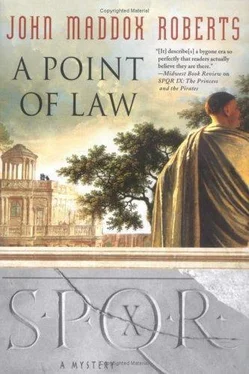John Roberts - A Point of Law
Здесь есть возможность читать онлайн «John Roberts - A Point of Law» весь текст электронной книги совершенно бесплатно (целиком полную версию без сокращений). В некоторых случаях можно слушать аудио, скачать через торрент в формате fb2 и присутствует краткое содержание. Год выпуска: 0101, ISBN: 0101, Издательство: St. Martin, Жанр: Исторический детектив, на английском языке. Описание произведения, (предисловие) а так же отзывы посетителей доступны на портале библиотеки ЛибКат.
- Название:A Point of Law
- Автор:
- Издательство:St. Martin
- Жанр:
- Год:0101
- ISBN:9780312337254
- Рейтинг книги:5 / 5. Голосов: 1
-
Избранное:Добавить в избранное
- Отзывы:
-
Ваша оценка:
- 100
- 1
- 2
- 3
- 4
- 5
A Point of Law: краткое содержание, описание и аннотация
Предлагаем к чтению аннотацию, описание, краткое содержание или предисловие (зависит от того, что написал сам автор книги «A Point of Law»). Если вы не нашли необходимую информацию о книге — напишите в комментариях, мы постараемся отыскать её.
A Point of Law — читать онлайн бесплатно полную книгу (весь текст) целиком
Ниже представлен текст книги, разбитый по страницам. Система сохранения места последней прочитанной страницы, позволяет с удобством читать онлайн бесплатно книгу «A Point of Law», без необходимости каждый раз заново искать на чём Вы остановились. Поставьте закладку, и сможете в любой момент перейти на страницу, на которой закончили чтение.
Интервал:
Закладка:
By the time I reached the Rostra, Hermes was standing there, and Sallustius was with him. I put on my biggest, most sincere false smile and took his oily hand and clapped his hairy shoulder.
“Caius Sallustius,” I shouted, “you are just the man I wanted to see!”
“So I presumed, since you sent your man to fetch me.” He tried for a sardonic smile, but on his face it was merely ugly. “I take it that this has something to do with your current difficulty?”
I gave him a surprised look. “You mean that silly business with the late Fulvius? Not at all! I simply wished to call upon your matchless-ah, scholarship concerning the political personages of our Republic.”
“I see,” he said, not buying a bit of it. “And just what would you know?”
“Well, since I’m to be one of next year’s praetors-”
“Assuming you aren’t in exile,” he interrupted.
“I wish people would stop saying that. This murder charge is false. Less than nothing.”
“Indeed.” He put a wealth of disbelief into the word.
“Anyway, it is almost certain that one of next year’s consuls will be Caius Claudius Marcellus. It occurs to me that I know very little about the man whom I shall have to work with for the next year. I don’t know much about the family, for that matter. They’ve always been around, but they’ve become uncommonly prominent of late.”
“That,” he said, “is because they’ve made themselves spokesmen for the anti-Caesarian bloc in the Senate.”
“I’ve deduced that much. How did this come about?”
“For one thing, you Metelli abandoned leadership of the anti-tyrannical party.”
I winced. That arrow had been straight at the mark. My family’s hedging and trimming, once the sign of statesmanlike willingness to compromise, was beginning to look like timidity and weakness.
“So the Claudii have thrust their family forward as champions of good old Republican liberty, eh? They seem to have a lot of people convinced.”
“And they’re willing to go to extremes to prove it.”
We had begun strolling toward the Basilica Aemilia, where the work of restoration went noisily on despite the general holiday atmosphere. Soldiers swarmed everywhere, strutting about to great admiration.
“What sort of extremes?” I asked him.
“Did you hear about the man from Novum Comum?”
The name sounded familiar. “Isn’t that one of the colonies Caesar founded in Gaul?”
“It is. Anyway, a few months ago Marcellus-our current consul Marcellus, that is-tried to bring up the prospect of a successor to Caesar in Gaul. This, of course, was opposed, not only by Caesar’s faction in the Senate, but by the other consul and by Pompey. One senator who spoke up was from Novum Comum. Marcellus went into an immoderate fury, had his lictors drag the man from the chamber, strip him of his insignia, and scourge him publicly with the rods of their fasces.”
I had thought myself numb to enormities, but this left me aghast. “He had a citizen publicly flogged?” Heads swiveled to see who was shouting. I went on in a lower voice. “Surely he’ll be exiled for this!” That the man had been a senator was a minor matter. By ancient law Roman citizens were not to be publicly flogged or crucified. These punishments were restricted to foreigners and rebellious slaves.
“That is just it. Marcellus proclaimed that Caesar had no right to confer citizenship, and he would recognize no such citizenships, nor would he tolerate any senators sent from any such colonies.”
At that time it was customary, when a new colony was enfranchised, to allow a very prominent man of that place to take a seat in the Senate without having first served a quaestorship in Rome.
“And what about Balbus?” I asked. I referred to Lucius Cornelius Balbus, a very prominent senator who, along with two or three others, got his senator’s stripe in the same fashion, because he was a friend of Pompey’s from Spain. He was no relation to the Atius Balbus who was Caesar’s brother-in-law and grandfather of the First Citizen.
“Marcellus isn’t picking a fight with Pompey.”
I ran a palm over my by now stubbly face. My bright mood of an hour before was gone. “It is worse than I thought,” I admitted. “If this keeps up, it will be open war between Caesar and the Senate.”
“It’s been war for some time.”
“I don’t mean political dispute, no matter how rambunctious it gets. I mean real war. Next year we could see these soldiers all around us back again, with their shields facing the gates and Caesar behind them on his command platform.” Caesar had invented a collapsible platform that could be erected in minutes, so that he could get close to the fighting and still see over the heads of his soldiers.
“Then now is a good time to choose sides, isn’t it?” Sallustius said, insinuatingly. I wondered what to read into this. He said almost everything insinuatingly.
“Are you offering me a side to choose?”
“Why,” his look was all innocence, “I assumed, because of your family connection and the obvious esteem Caesar holds for you, that you would be firmly in his camp.”
This angered me and I was about to snap out something ill-considered when Hermes rapped me sharply over the kidney. Sallustius couldn’t see the jab, but I could certainly feel it.
“Isn’t that our friend the tribune over there?” Hermes said, nodding toward a little group of men who seemed to be looking over the restoration work. One of them was, indeed, young Tribune Manilius. The other four men were vaguely familiar to me. I knew I had seen their faces in the Senate. Three of them resembled one another strongly, with bushy, brown hair and thick, red noses. They stood just within the portico of the basilica. They all seemed to be arguing about something.
“This is why I led you here,” Sallustius said. “I saw them cross the Forum and climb the steps here a bit earlier. You see, of course, the three who look like they hatched from the same egg?”
“Naturally. Is one of them Marcellus?”
“They all are. The one on the left, with the old sword scar on his cheek, is this year’s consul, Marcus Claudius Marcellus. The one poking his finger in the tribune’s face is his cousin Caius, who is most likely to be next year’s consul. The third, who looks like he needs an enema, is Caius’s brother, another Marcus Claudius Marcellus. He plans to stand for the consulship the following year.”
“And the fifth man?” I asked.
“That is Lucius Aemilius Lepidus Paullus, also standing for next year’s consulship, and the man having this basilica restored to the glory of his ancestors.”
“With Caesar’s money, I hear.”
“Caesar is generous to his friends,” Sallustius affirmed.
The evidence was apparent everywhere. The walls of the portico were being covered with exquisite mosaics depicting the history of the Aemilian gens back to the days of Romulus, the whole interior was faced with brilliantly colored marble, the old roof tiles had been stripped away and replaced by plates of gleaming bronze. The restored basilica would be the most magnificent public building in Rome, at least until some other politician decided to bankrupt himself for the sake of public adulation.
“This seems like an odd group to see in one place,” I observed.
“Odd groupings have become the rule in Rome,” Sallustius said. “Men who were at each other’s throats just a few months ago are now comrades-in-arms.”
Just then one of the Marcelli noticed us and nudged the others. The consul looked at us and frowned.
“What are you doing here?”
“I thought I’d just pop over and see how the restorations are coming along,” I told him. “It looks wonderful, Lucius Aemilius.”
Читать дальшеИнтервал:
Закладка:
Похожие книги на «A Point of Law»
Представляем Вашему вниманию похожие книги на «A Point of Law» списком для выбора. Мы отобрали схожую по названию и смыслу литературу в надежде предоставить читателям больше вариантов отыскать новые, интересные, ещё непрочитанные произведения.
Обсуждение, отзывы о книге «A Point of Law» и просто собственные мнения читателей. Оставьте ваши комментарии, напишите, что Вы думаете о произведении, его смысле или главных героях. Укажите что конкретно понравилось, а что нет, и почему Вы так считаете.









